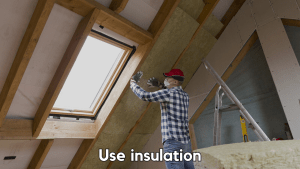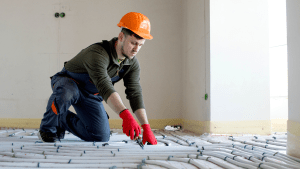Winter is coming, and it will be cold and long. There is no better feeling than finding your building, house, or property warm and cozy. Yet, it’s difficult to get cozy while your home is losing its heat which is the main problem that we tend to solve today.
The issue is that most houses and properties in the UK suffer from heat loss.

Likely for you, in this article, we will break out the reasons plus the solution of heat loss. You will learn how to lower energy consumption and reduce heat loss in your house.
Stay warm and save money.
Where am I losing the heat in my house?
If you want to reduce heat loss in your home and property you need to identify the source of losing the heat. Did you know that you are not taking full advantage of your heating system, instead you make little mistakes that cost you losing heat and losing money?
Gaps, cracks, and opened windows are our top reasons for heat loss. Maybe you can close a window to control heating, but gaps and cracks are still a problem.
Usually, you find them in the walls, floor or roof, this is where you are losing heating. Approximately 25% of your home heating will split out through the gaps and cracks. 10% of your heat will vanish through your floor, especially under doors.
Furthermore, if you have a basement, that could be a problem for your heating system. Basements are considered a heat control nightmare. Especially an unfinished basement, its walls will cost you 20% of your heart.
How do you tell that your house has a heat loss problem?
- Check for air drafts around your doors, windows especially the frames
- Check for cracks and gaps in your roof and walls.
- Check your roof and see for frost. If you notice a lack of frost on your roof and your neighbor’s roof contains frosts that’s a strong sign of a heat loss problem.
Now, how do you plan to fix the problem?
1-The thermal envelope
As stated before in the reasons, walls, roofs, floors, and windows could be what causes you to lose heating. Fortunately, there are several solutions, and the first one is to use a thermal envelope.
A thermal envelope or building envelope helps to separate the heat and prevent losing it. The thermal envelope will reduce heat loss by acting as a barrier.
It will separate in house conditioned space with outhouse unconditioned- space
The advantage of using a thermal envelope is that it reduces your energy consumption, energy bills, and heat loss.
2-Use insulation to stop heat leaving through the roof

Your roof could cause you to lose 25% of heat, meaning a quarter of heat consumption will disappear without benefiting from it. You will lose heat and lose money.
To stop the heat leaving from your roof insulate your home, it’s cheaper, effective plus an energy bill reducer. Through insulating your home you ensure blocking the warm air from leaving through the roof and maintaining your house temperature.
House insulation improves your heating system performance and prevents any heat leakage through the roof.
3-How to reduce heat loss from your walls
In the UK most properties that were built before the –1920s-1930s were built with solid walls. After that time, all properties were built with cavity walls. Two types of walls, which means you have one solution of the two to consider depending on the nature of your house walls.
Stop heat loss from solid walls
To reduce heat loss from solid walls you have two options here. Insulate your walls internally or externally. What does it mean?
Insulating your walls externally requires you to add a layer of insinuating materials on the outer side of the property. External wall insulation prevents weather penetration and helps reduce heat loss from your walls.
Insulating your walls internally is slightly different from insulating them externally. Internal walls insulation experts will either build a stud wall in front of your walls or add rigid insulation boards to your walls.
Stop heat loss through cavity walls
The insulation experts typically use mineral wool or polystyrene beads as insulating materials to insulate cavity walls, a specialized company will inject insulation materials from outside the walls through wall holes and seal them up.
4- Will windows reduce heat loss?
When the freezing weather hits your only and primary focus will be on maintaining your hope comfortably and warm. Among other things, heat loss can also occur through your windows gaps and cracks. You can’t maintain a comfortable house until you find a solution.
To reduce heat loss through windows there is more than one way. For example, you can put drapes on your windows, which are cheap and effective in keeping the heat in.
Investing your money in double glazing, they have proved to be super-efficient in reducing heat loss and keeping your rooms warm and comfortable. To prevent heat escaping, close your windows gaps by using sealant or putty to close walls, windows, and doors gaps.
5- Use underfloor heating system

To keep your floor warm all over the winter, you may consider insulating your floor, or you could invest in an underfloor heating system. Both are effective but installing, and underfloor heating will improve your comfort levels and reduce heat loss.
If you don’t know how to do it, ask for companies that specialize in installing underfloor heating, once they install it connect it to your boiler.
As for houses that contain gaps between floorboards, there is an easy and cheap solution. Take paper-mâché and fill them into the floorboard gaps.
6- How to reduce heat loss through doors?
If your heat is escaping through your door gaps or under them. Consider either replacing it or refurbishing it. You should replace your door only if it’s damaged, if not, go for the second option.
You can insulate the wooden panel within your door, it will reduce energy consumption and heat loss. But, if you are looking for smoothing, add double glazing, it will certainly make your life warmer through the cold days of winter.
7-Insulate water pipes
If you are looking for a way to reduce water pipes’ energy consumption and reduce heat loss, insulating them might work. Insulated water pipes will improve work efficiency, reduces energy bills, and prevent heat from escaping your home.
When must you upgrade your heating system?
When should I replace my heating system?
When we hear this question a lot, we answer it with the same answer. There is no direct or single answer. It depends on many factors, including your heating system type, age, and work efficiency.
If you use a gas boiler heating system then there are signs to detect before upgrading your heating system.
If you notice an increase in energy consumption, that usually means that your heating system is less efficient and weak.
Heating boilers are like humans, they won’t last forever. So if your heating system is old you best hire an excerpt for inspection or just replace it with a new one.
Temperature, comfort issues, and humidity issues also indicate that your heating system is weak, and it’s time to upgrade it. You can also add to the list noise issues. If your boiler is making noises, it’s time to upgrade it or fix it by hiring a specialist.
The importance of heating control
Assuming you’ve followed each and every single method but without installing the proper heating control you will harm yourself rather than helping yourself.
The idea of using a heating control system is to reduce energy consumption, save money and control your home temperature.
Houses without heating control will suffer from hot heat problems instead.
Why is that?
If you keep your heat from escaping at some point, your house will get very hot and need to discharge some of its heat. Heating control helps with it, after reaching a certain temperature, it will shut down your heating system automatically and therefore keeps our house warm.
How to be energy self-sufficient?
- Solar panels: fitting solar panels over your roof allow you to generate electrical energy by turning sunlight photons into actual electricity
- Wind turbines: The same as solar panels, it allows the generation of energy from wind power.
Hydroelectric: or hydropower, helps to generate electrical energy from falling water.









